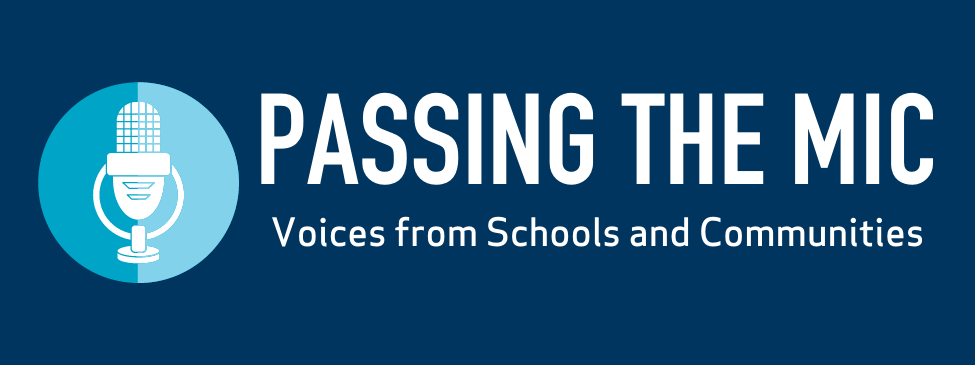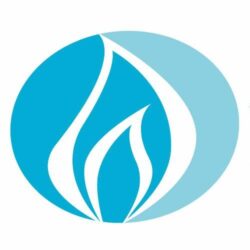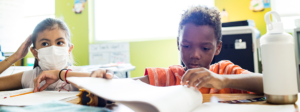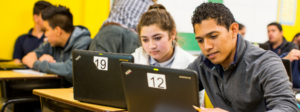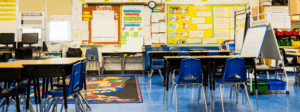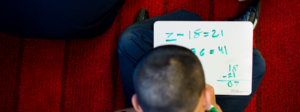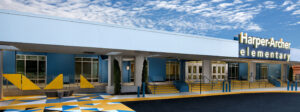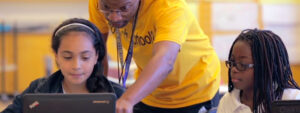Our new video series, Passing the Mic, features candid conversations with education leaders from across the country about what’s working, what’s not, and what we still don’t know about ensuring students get the educational opportunities they deserve during this uniquely challenging moment.
In Episode 4, TNTP’s Kristy Sullivan moderates a conversation with three education leaders from across the country on the challenges and the importance of authentic community engagement during the COVID-19 pandemic. Panelists include Dr. Samuel Williams, principal of Rayville High School in Richland Parish, Louisiana; Veronica Crespin-Palmer, co-founder and CEO of RISE Colorado; and Dr. Peggy Aune, associate superintendent of Collier County Public Schools in Florida. You can watch the entire conversation above or here, and read excerpts below.
You can find previous episodes of Passing the Mic here.
From your perspective as a school leader, as a parent, an advocate, a district administrator, what would you have done differently if you had known that last day of school before things shut down was the last day of the year?
Veronica Palmer: I actually did have this conversation with my daughter, who is now eight. She just wishes she could have said goodbye. Because a lot of her friends were not able to join online for whatever reason. But that was really jarring for my daughter. She was like, “Mom, my friends aren’t here anymore. I don’t know where they went and my teacher doesn’t know where they went.” So that was just really jarring as a second grader that, I went from being with all my friends in my classroom to now we’re online. But a lot of my friends aren’t here. So she just wished she could have said goodbye to process that social-emotional piece.
Peggy Aune: Here in Collier County we actually were on spring break and anticipating returning. And so never returned from spring break through the end of the school year. So just relationally, that sense of closure was interrupted. But we really tried to find ways proactively and positively to provide that. Certainly, for seniors, it was virtual graduations, really celebrating and making that special. Other schools were incredibly creative, and parents tried to find ways to really meet that gap. And our teachers were making those virtual connections to students as we transitioned to online learning.
What are some new things that you have learned about your district or your school or your community during this time of uncertainty?
Samuel Williams: As a teacher, you have that compassion for your children, your students, or they become your children like your students. And it’s almost been like a rallying cry to where we’ve all been able to come together to say, “Well, what can we do now to support these kids? What can we offer these kids to make them better while they’re out?” But that has been one thing I think the district has been very good at here in Richland Parish. Everyone has some type of stake in making sure every child is still given that same support, whether it be in this brick and mortar situation or on the virtual platform. Everyone has some kind of buy into making sure that everyone in this district—community members, parents, and family members, as well as students—try to provide some kind of support.
Veronica Palmer: I’ve always known our Black, Latinx, immigrant, and refugee communities are resilient, strong, and powerful, but seeing it in action during a pandemic—we all need to learn from that. We were very worried for a while once the moratorium was going to end on eviction like, “Oh my goodness, our families are going to be facing eviction because many of them lost their jobs.” Many of them got their hours cut because they’re in the food industry and the hotel and service industry. And when our organizers called families to check-in, as they do weekly, families were like, “We’re good. We actually borrow money from each other. We share money with each other. We take care of each other.” And that was really powerful. We need to remember that our families have survived a lot.
How can community members and families be better partners in the academic and the learning process?
Veronica Palmer: I really feel like we need a huge mindset shift in how we see, approach, and treat families. Do we really view them as assets? Do we really view them as true partners and experts in their child’s education? Or do we view them as something we must do, we must get around, we must deal with? And do things to and for and not with them. So what we’d like to see is that educators see families as not just, “Oh, families don’t care, they’re too busy, they don’t value education.” But actually like, “Oh, families care. They do value education. They do want to be involved.” But how are we as an education system meeting families where they’re at, and providing them with the opportunities to get involved that are culturally responsive to them? How do we make families feel like they’re welcomed and matter, and that they can truly bring their gifts and talents to the table beyond just showing up to back to school or parent-teacher conferences?
Samuel Williams: I think, as a matter of fact, we’ve got to get the community in. The expectation was for them to come to us. We have to get out there to them and promote our school systems and say that we are just as concerned as you are about your child.
What’s a piece of advice that you would give to a peer or colleague in this moment?
Samuel Williams: Be innovative. And this is not a time to be afraid to come up with an idea and if it doesn’t work out, then you go back to the drawing board. So it’s just such a different time for all of us that… I can’t have the perfect solution. I told my superintendent, my biggest flaw that I know in myself is the ability to delegate responsibilities. And I know within me that has to change. And so I try my best now to empower my staff members, give them things, take it off my plate. And this is that perfect opportunity where there’s so much to do, that one person can’t do it. Two people can’t do it. Maybe sometimes the entire staff can’t do it all at once, but if we get together, put our hands together, share the leadership with people that you need to trust—everyone is here for one goal, to educate our students.
Peggy Aune: I think with all the listening and being very transparent and getting very many different viewpoints, we also have to be steadfast in what we really hold true and know is right and good for students and families. And by that I mean not everyone is going to like every decision, and things are going to happen and there’s going to be changes. But if we keep our priorities front and center—around health and safety, high-quality educational access for all students and what students and families are experiencing—and look at it from that lens and how we can always be better, I think we’ll be heading in the right direction. And it will be challenging, but I’m optimistic about what we have going forward. And let’s not waste an opportunity to make innovation and change.
